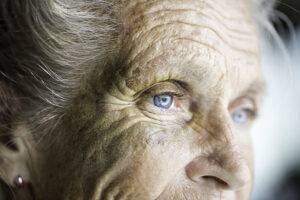January 11, 2023

When caring for an older loved one, try these tips to reduce the risk of bruising in seniors.
Of the many changes that manifest as people age, bruising in seniors is one that can be alarming for family members to see in their loved ones. It is vital to talk to the person’s doctor any time there’s a health problem, but it is also important to know that senior bruising is actually quite common. Bruising in seniors commonly is a result of the thinning of the skin and a decrease of fat that is common with growing older. Even a mild bump to older skin can cause much more pronounced bruising than that in younger skin.
Continuum, a leading provider of respite care in Chesterfield and the surrounding areas, suggests the tips below to help decrease the risks for bruising and to help heal bruises when they do occur:
How Can I Aid in the Prevention of Senior Bruising?
- Evaluate the safety of the senior’s home and property, making sure there are wide walking paths that are free of objects the senior might trip over or bump into. Continuum can help assess the person’s home for safety hazards as well.
- Encourage the person to wear long sleeves and pants when undertaking activities that could result in an injury to the skin, like gardening or housework.
- If the senior is a smoker, provide support to help them quit. Smoking decreases the production of collagen, which can result in easier senior bruising.
- Be sure that the person’s diet contains lots of vitamin C, which plays a critical role in collagen production.
- Determine if the individual takes any of the medicines listed below, as they can raise the risk of bruising in seniors (NOTE: Never stop any medication without the doctor’s approval):
- Corticosteroids
- Aspirin
- Antiplatelet medications
- Anticoagulants (coumadin, heparin)
- NSAIDs (Advil, Aleve, and ibuprofen)
What Should I Do to Help Heal Bruises in Older Adults?
- Put a cold compress on the bruise for 20 minutes to reduce the blood flow to the bruise. This can help decrease the size of the bruise and also reduce swelling.
- If possible, raise the bruised area.
- Utilize a compression bandage to help reduce swelling.
Make certain that the individual receives immediate medical help for any bruises that arise for no apparent reason, especially if the person has started taking a new medicine or if bleeding occurs in other parts of the body, such as the nose or gums.
Continuum’s senior care team is skilled in a variety of home care services and can help manage a variety of concerns, including senior skin needs, such as:
- Help with walking to prevent falls and other injuries
- Showers or baths and moisturizing
- Checking the skin for bruises or other changes
- And much more
Reach out to us today at (314) 863-9912 or (636) 861-3336 for more skin care tips for older adults and to learn more about our in-home care services, including respite care in Chesterfield and the surrounding areas.
